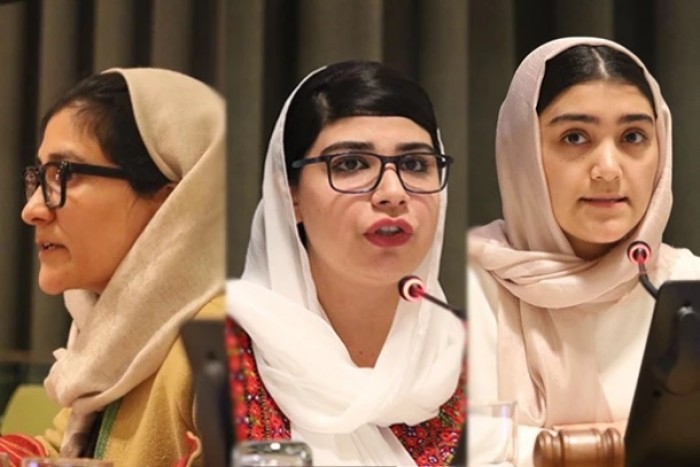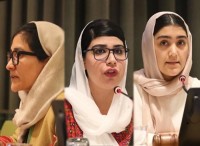Rassegne stampa

Three inspiring Afghan women call on the international community to urgently support girls’ and women's education
By UNESCO
06-02-2023 - “Today an Afghan girl, who wants access to the basic human right of education has two choices: If she’s lucky, go overseas – or go underground. Become a refugee or effectively become a criminal within Afghanistan. We are talking about a 12-year-old child.”These are the powerful words of Shabana Rasikh, Founder of School of Leadership Afghanistan, who was among three Afghan women who took the floor at an event organized at the United Nations in New York to mark this year’s International Day of Education on 24 January. UNESCO dedicated the Day to girls and women in Afghanistan who have been deprived of their right to education and has been calling for the immediate lifting of the ban restricting their access to school.
Ms Rasikh’s institution, School of Leadership Afghanistan was a boarding school for girls operating in Kabul from 2006 until 2021. It had to relocate the entire school community to Rwanda where it is currently based.
“The reality is that a woman without access to education is a woman without agency,” said Ms Rasikh. “She is a woman without financial or personal independence. A woman who lives with her hand out, completely reliant on others for her basic needs.”
Since September 2021, the return to school for all Afghan girls over the age of 12 have been indefinitely postponed leaving 1.1 million girls and young women without access to formal education.
In December 2022, university education for women was suspended until further notice, affecting over 100,000 female students attending government and private higher education institutions.
“First the Taliban robbed Afghan women of our right to secondary school, then it was our right to university,” said Ms Rasikh. “No girls graduating high school; no women with college degrees; no freedom to find work; and no skills to bring to any work force. Nowhere to exist beyond the walls of the home. No independence, no freedom, no voice, no hope. This is the future they want.”
Ms Rasikh called on the international community for investment to ensure that Afghan female refugees have access to quality education in their hosts countries.
“So that each Afghan girl in exile becomes an educated Afghan woman ready to return home to Afghanistan,” she said. Ms Rasikh also pleaded for increased investment in online learning and to find innovative, safe and effective means of reaching all girls inside the country.
“What is one girl worth? She is worth everything. And she can do anything,” Ms Rasikh concluded.
“Unfortunately, the international community, world leaders and the world collectively, failed us. And by us, I mean the future. The future that we all share together,” said Aydin Sahba, a student at the School of Leadership Afghanistan and an activist who gave another powerful testimony at the event in New York.
“I want the world to fight for my sisters,” she said. “Because my sisters – all of them, back home – are worth the fight [….] As the current crisis continues to affect the lives of millions of young Afghan girls, we need to be fully aware of the roots and the long-term impacts of such crisis, and act accordingly. Only opening the doors to schools and universities is not the ultimate solution anymore.”
Ms Sahba reminded the audience that the quality and the content of education delivered to children in Afghanistan must equally be addressed. She also applauded the girls’ and women in Afghanistan protesting every day on the streets throughout the country and demanding that the ban on their right to education be lifted.
Afghan activist and writer Pashtana Dorani who was forced into exile also shared her story. She is the Founder and Executive Director of Learn Afghanistan, the country’s first digital school network.
“It’s time for world leaders to understand that education in Afghanistan is not a six-month project,” she said. “It’s a lifelong term commitment.”
Ms Dorani brought to light some of the challenges related to the development of tools, teacher training and making education content accessible in local languages both offline and online. She also suggested alternative funding mechanisms and solutions to support communities in the country who are making a different and fighting for their rights.
“Access to education doesn’t mean that every girl in Afghanistan will have access to opportunity,” she said. “Because access to education, without any opportunity does not mean anything. If you do not have financial independence, if you do not have emotional independence, and if you do not have the right to move, to travel or to talk freely.”
Currently, 80% of school-aged Afghan girls and young women – 2.5 million people are out of school. Nearly 30% of girls in Afghanistan have never entered primary education.
How does UNESCO support education in Afghanistan
UNESCO has been strongly involved in supporting the education system in Afghanistan during the last 20 years. Since August 2021, it has shifted its interventions to ensure continuity of education through community-based literacy and skills development classes for over 25,000 youth and adults, including 60% women and adolescent girls in 20 provinces. Its advocacy campaign “Literacy for a Brighter Future” reached out to over 20 million Afghans to increase public awareness of the right to education for youth and adults, especially women and adolescent girls.
UNESCO is also working on an education data monitoring initiative to ensure reliable data so that education partners channel funding to the most critical and unmet education needs.
//www.unesco.org/en/articles/three-inspiring-afghan-women-call-international-community-urgently-support-girls-and-womens?TSPD_101_R0=080713870fab20009a11062d43a59c18f8850705e986f79df44ad9a16a33fdac146006265bce15c4085077dde61430007231710bc9234537a3712d7265012ad12c274542ef9d2ccab82b8f0074e6a20f7e7f1798abdb831df57edf76e890d2aa
Redazione
Rassegne stampa
11-07-2024 - GD - Roma, 9 lug. 24 - Ci risiamo. I codardi russi continuano a bombardare da grande distanza i civili ucraini. Il barbaro attacco di ieri all’ospedale...
20-06-2024 - Una ricompensa da 10 milioni di dollari sulla sua testa, «Specially Designated Global Terrorist» dal 2008 per il Dipartimento di Stato Usa, a lungo...
20-06-2024 - AFGHANISTAN
A pochi giorni da un’importante conferenza dell’Onu sull’Afghanistan, botta e risposta tra Richard Bennett, relatore speciale delle...
14-06-2024 - Quale futuro per la difesa europea? La domanda è stata posta con forza durante il convegno organizzato dal Centro Studi Machiavelli che si è tenuto...
08-06-2024 - La cultura dominante sulle nuove imprese dimentica l'importanza di una solida politica industriale per le piccole e medie imprese italiane dell'aerospazio,...





